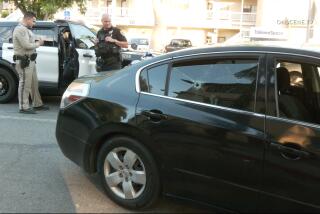Tollway Price Is Fair, OCTA Says
- Share via
The Orange County Transportation Authority on Monday defended its offer of $207.5 million to buy the privately owned 91 Express Lanes, a controversial tollway that has been blamed for aggravating congestion on the heavily traveled Riverside Freeway.
“This is a fair price,” said Arthur T. Leahy, OCTA’s chief executive officer and chief negotiator in the pending sale. “Demand for the road is very high and projected revenue will cover its debts.”
To help explain the proposed sale price, the agency’s board of directors on Monday released thousands of pages of studies assessing the roadway’s value. This was in response to a public records request by the Los Angeles Times and the Orange County Register.
“The goal of this board is to build public confidence that the decisions made thus far ... have been made after a thoughtful and deliberative analysis,” said Supervisor Todd Spitzer, who chairs the OCTA board of directors.
The tollway, built for about $135 million in the mid-1990s, runs for 10 miles in the median of the Riverside Freeway from north Anaheim to Riverside County. There are two lanes in each direction.
If the sale goes through, the county agency would assume tollway debts and pay California Private Transportation Co. $72.5 million, a healthy profit given the company’s initial investment.
Some at OCTA board meetings have questioned whether it is a fair price for an operation that has had trouble turning a profit.
“It’s fine that OCTA wants to control the road,” said Eric Norby of Laguna Beach, who helped with the successful supervisorial campaign of his brother Chris Norby. “I just want to make sure the price is supported by third-party evaluations and that OCTA is not paying too much.”
The impetus to buy the lanes is the desire to end the tollway’s controversial non-compete agreement with Caltrans that barred the highway agency from widening or making significant improvements to the Riverside Freeway that could cut into the company’s toll fees. The Riverside Freeway is one of the most crowded routes in Southern California.
After months of negotiation, OCTA announced in late April an agreement with the tollway’s owners. The sale is contingent upon an OCTA evaluation of the company’s financial records and contracts. The state Legislature also must grant OCTA the power to charge tolls. The parties hope to complete the sale by September.
OCTA officials say they will operate the Express Lanes as a tollway and use the revenue to pay off its bonds. The authority, with cooperation from Riverside County, also plans to begin long-awaited improvements to relieve congestion on the Riverside Freeway.
The proposed sale price is based on an analysis by the accounting firm of Ernst & Young, research by OCTA’s financial staff, and a separate OCTA comparison of the costs to build a similar project today.
Using a range of traffic and revenue projections, Ernst & Young concluded that the Express Lanes are worth an estimated $202 million to $220 million. An OCTA study valued them at $210 million to $215 million. The construction comparison concluded that it would cost about $200 million today to build 10 miles of 4-lane highway.
Conservative financial estimates by OCTA indicate that the Express Lanes will provide ample revenue so the authority can pay the interest and principal on the tollway’s bonds.
“At the beginning it will be a little bit tight,” said Kirk Avila, OCTA’s treasury and public finance manager. “But in the long run, revenues will be going up, there will be some inflation affecting operating costs, and debt service will remain flat.”
Given the region’s projected population growth, the studies indicate that there will be increasing demand for the Express Lanes and the Riverside Freeway, the only major highway link between the Inland Empire and Orange County.
OCTA estimates that from 2003 to 2025 annual revenue for the Express Lanes will increase from about $26 million to about $64 million. Operating costs and capital improvements will rise from more than $10 million a year to about $26.5 million. Meanwhile, interest and principal payments will remain about $12 million a year.
OCTA officials further justified the sale price by comparing OCTA’s actual costs of designing and constructing car pool lanes in a center divider equal in length to the tollway. Researchers also relied on carpool lane costs from the Southern California Assn. of Governments.
More to Read
Sign up for Essential California
The most important California stories and recommendations in your inbox every morning.
You may occasionally receive promotional content from the Los Angeles Times.














